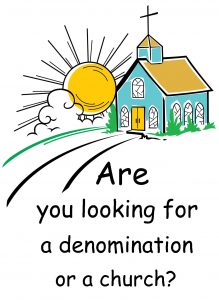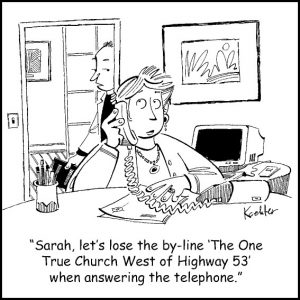Choices change our lives…
By Barbara Dahlgren

Jesus said to Peter, “On this rock I will build my church.” (Matthew 16:18) However, “church” in the Bible does not translate into Baptist, Catholic, Protestant, Methodist, Seventh Day Adventist, or Lutheran. In Greek it is “ecclesia” meaning “those who have been called out.” They have been “called out” of a world that rejects God and “into” a fellowship with God and others who believe in God. So which denomination is this “church” Jesus refers to?
Some may say these “ecclesia” would be non-denominational. In fact, people pride themselves in saying, “Oh, I’m not a part of any denomination. I’m non-denominational.” This could be called the “Non-Denominational Denomination” which makes them just as much a part of a denomination as anyone else. They just don’t have a recognized name yet. They might be called “The Church on the Hill,” “The Church in the Valley,” “The Church on the River,” “The Church in the Clouds,” or “The Church in the Closet.” We don’t lack for churches or denominations because we Christians love our schisms.
Schisms have always been a part of the Christian heritage because, believe it or not, all Christians don’t see eye-to-eye on everything. In fact, there has never (and probably will never) be a time when all Christians worship the same way or believe the same things. In biblical times, even Paul and Barnabus went their separate ways. And people have always had a tendency to look to men rather than God. “I am of Apollo. I am of Paul. I am of Cephas.” (I Corinthians 1:11-13) The early church also dealt with Judaizers who believed men should be circumcised and adhere to rituals to gain salvation, and Gnostics who felt they had secret knowledge.
A few centuries later the Great Schism divided the Eastern and Western churches over certain issues, one of them being whether or not to use leavened or unleavened bread during Communion. Also the East was a little more traditional and the West a little more contemporary. Some things never change. Then there was the Protestant Reformation where those who protested broke away from the major denomination of the day, Catholicism. They objected to certain Catholic practices such as being able to buy your way out of sin through indulgences.
Doctrinal differences can divide churches such as full immersion baptism versus sprinkling or meeting on Saturday versus Sunday. Many times people disagree over scripture interpretation such as what it means to speak in tongues. Social issues can play a prominent part in church schisms like slavery did around the time of the Civil War. As society changes, views change. Today hot topics causing schisms are views on gay couples and what role should women play at church. Everyone has an opinion.
What does God think about all these denominations? Is this what He had in mind? I’m not sure. The Bible does say, “There must be heresies among you, that they which are approved may be made manifest among you.” (1 Corinthians 10:19) And when the disciples were upset about someone not a part of their group casting out demons in Jesus’ name Jesus said, “Forbid him not: for he that is not against us is for us.” (Luke 9: 49, 50)
Perhaps the greater danger with denominations is when some feel they are the only true “church” and have a corner market on truth. Frankly, there isn’t a denomination around that hasn’t muddled the message of Jesus in one way or another. New denominations will be no different. New is not bad as long as people realize there is nothing new under the sun. That would make a catchy name for a church, “There’s Nothing New Under the Sun Church.” However, here’s a list of churches you might want to avoid:
- Don’t Confuse Me with the Facts Church
- Don’t Call Us We’ll Call You Church
- I May Be Stupid but I’m Not Dumb Church
- I May Be Dumb but I’m Not Stupid Church
- We’re Okay but No One Else Is Church
- We Know It All Church
- You Can’t Teach an Old Dog New Tricks Church
- I Know a Secret and You Don’t Church
- God Told Me to Do This Church
Consider this… Not much is said about denominations in the Bible but much is said about Jesus – His life, His example, His teachings, His death, and His resurrection. Much is said about love, respect, joy, peace, patience, goodness, faith, meekness, and self- control. These are the qualities to look for. These are the unifying factors you want in a Christian community. Look for these common denominators and the “ecclesia,” the “church,” will be found.
One final thought… It is not a denomination that is saved, but a person.


